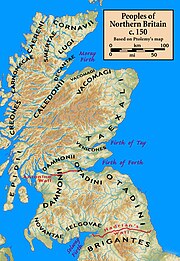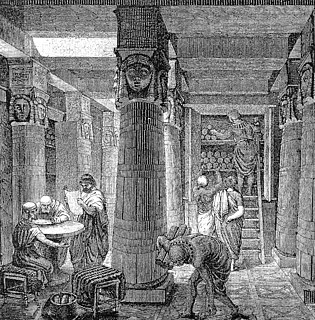
The Great Library of Alexandria in Alexandria, Egypt, was one of the largest and most significant libraries of the ancient world. The Library was part of a larger research institution called the Mouseion, which was dedicated to the Muses, the nine goddesses of the arts. The idea of a universal library in Alexandria may have been proposed by Demetrius of Phalerum, an exiled Athenian statesman living in Alexandria, to Ptolemy I Soter, who may have established plans for the Library, but the Library itself was probably not built until the reign of his son Ptolemy II Philadelphus. The Library quickly acquired many papyrus scrolls, owing largely to the Ptolemaic kings' aggressive and well-funded policies for procuring texts. It is unknown precisely how many such scrolls were housed at any given time, but estimates range from 40,000 to 400,000 at its height.

Claudius Ptolemy was a mathematician, astronomer, astrologer, geographer, and music theorist, who wrote about a dozen scientific treatises, three of which were of importance to later Byzantine, Islamic, and Western European science. The first is the astronomical treatise now known as the Almagest, although it was originally entitled the Mathēmatikē Syntaxis or Mathematical Treatise, and later known as The Greatest Treatise. The second is the Geography, which is a thorough discussion on maps and the geographic knowledge of the Greco-Roman world. The third is the astrological treatise in which he attempted to adapt horoscopic astrology to the Aristotelian natural philosophy of his day. This is sometimes known as the Apotelesmatika but more commonly known as the Tetrábiblos, from the Koine Greek meaning "Four Books", or by its Latin equivalent Quadripartite.

Cleopatra VII Philopator was queen of the Ptolemaic Kingdom of Egypt from 51 to 30 BC, and its last active ruler. A member of the Ptolemaic dynasty, she was a descendant of its founder Ptolemy I Soter, a Macedonian Greek general and companion of Alexander the Great. After the death of Cleopatra, Egypt became a province of the Roman Empire, marking the end of the second to last Hellenistic state and the age that had lasted since the reign of Alexander. Her native language was Koine Greek, and she was the only Ptolemaic ruler to learn the Egyptian language.

Ptolemy I Soter was an Ancient Macedonian general, historian and companion of Alexander the Great of the Kingdom of Macedon in northern Greece who became ruler of Egypt, part of Alexander's former empire. Ptolemy was pharaoh of Ptolemaic Egypt from 305/304 BC to his death. He was the founder of the Ptolemaic dynasty, which ruled Egypt until the death of Cleopatra in 30 BC, turning the country into a Hellenistic kingdom and Alexandria into a center of Greek culture.
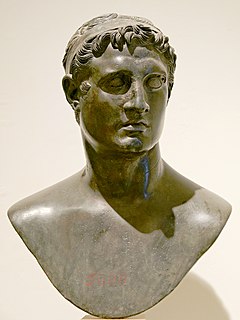
Ptolemy II Philadelphus, also known posthumously as Ptolemy the Great, was the pharaoh of Ptolemaic Egypt from 283 to 246 BC. He was the son of Ptolemy I, the Macedonian Greek general of Alexander the Great who founded the Ptolemaic Kingdom after the death of Alexander, and Queen Berenice I, originally from Macedon in northern Greece.
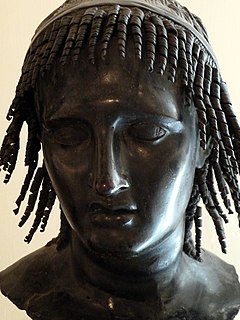
Ptolemy Apion or simply known as Apion was the last Greek King of Cyrenaica who separated it from the Ptolemaic Kingdom of Egypt, and in his last will bequeathed his country to Rome. He was a member of the Ptolemaic dynasty.

The Epidii were a people of ancient Britain, known from a mention of them by the geographer Ptolemy c. 150. Epidion has been identified as the island of Islay in modern Argyll. Ptolemy does not list a town for the Epidii, but the Ravenna Cosmography mentions Rauatonium, which is assumed to be Southend.
The Novantae were a people of the late 2nd century who lived in what is now Galloway and Carrick, in southwesternmost Scotland. They are mentioned briefly in Ptolemy's Geography, and there is no other historical record of them. Excavations at Rispain Camp, near Whithorn, show that it was a large fortified farmstead occupied between 100 BC and 200 AD, indicating that the people living in the area at that time were engaged in agriculture.

The Geography, also known by its Latin names as the Geographia and the Cosmographia, is a gazetteer, an atlas, and a treatise on cartography, compiling the geographical knowledge of the 2nd-century Roman Empire. Originally written by Claudius Ptolemy in Greek at Alexandria around AD 150, the work was a revision of a now-lost atlas by Marinus of Tyre using additional Roman and Persian gazetteers and new principles. Its translation into Arabic in the 9th century and Latin in 1406 was highly influential on the geographical knowledge and cartographic traditions of the medieval Caliphate and Renaissance Europe.

The Venicones were a people of ancient Britain, known only from a single mention of them by the geographer Ptolemy c. 150 AD. He recorded that their town was 'Orrea'. This has been identified as the Roman fort of Horrea Classis, located by Rivet and Smith as Monifieth, six miles east of Dundee. Therefore, they are presumed to have lived between the Tay and the Mounth, south of Aberdeen. Andrew Breeze has suggested that the tribal name probably means "hunting hounds". A slightly differing etymology, "kindred hounds", identifies the name with Maen Gwyngwn, a region mentioned in the Gododdin.

The Taexali were a people of ancient Scotland, known only from a single mention of them by the geographer Ptolemy c. 150. From his general description and the approximate location of their town or principal place that he called 'Devana', their territory was along the northeastern coast of Scotland and is known to have included Buchan Ness, as Ptolemy refers to the promontory as 'Taexalon Promontory'.

The Lugi were a people of ancient Britain, known only from a single mention of them by the geographer Ptolemy c. 150. from his general description and the approximate locations of their neighbors their territory was along the western coast of the Moray Firth. Ptolemy does not provide them with a town or principal place.

The Ptolemaic Kingdom was an Ancient Greek state based in Egypt during the Hellenistic Period. It was founded in 305 BC by Ptolemy I Soter, a companion of Alexander the Great, and lasted until the death of Cleopatra VII in 30 BC. Ruling for nearly three centuries, the Ptolemies were the longest and most recent Egyptian dynasty of ancient origin.

The Cornovii were a people of ancient Britain, known only from a single mention of them by the geographer Ptolemy c. 150. From his description, their territory is reliably known to have been at the northern tip of Scotland, in Caithness. Ptolemy does not provide them with a town or principal place.

The Decantae were a people of ancient Britain, known only from a single mention of them by the geographer Ptolemy c. 150. From his general description and the approximate locations of their neighbors, their territory was along the western coast of the Moray Firth, in the area of the Cromarty Firth. Ptolemy does not provide them with a town or principal place.

The Smertae were a people of ancient Britain, known only from a single mention of them by the geographer Ptolemy c. 150. From his general description and the approximate locations of their neighbors, their territory was in the modern area of central Sutherland. Ptolemy does not provide them with a town or principal place.

The Caereni were a people of ancient Britain, known only from a single mention of them by the geographer Ptolemy c. 150. From his general description and the approximate locations of their neighbours, their territory was along the western coast of modern Sutherland. Ptolemy does not provide them with a town or principal place.

The Creones were a people of ancient Britain, known only from a single mention of them by the geographer Ptolemy c. 150. From his general description and the approximate locations of their neighbors, their territory was along the western coast of Scotland, south of the Isle of Skye and north of the Isle of Mull. Ptolemy does not provide them with a town or principal place.

The Vacomagi were a people of ancient Britain, known only from a single mention of them by the geographer Ptolemy c. 150. From his general description and the approximate locations of their neighbors, their territory was the region roughly comprehending the old districts of Banffshire, Elginshire, Nairnshire, and the eastern portion of Inverness-shire. Ptolemy says that their towns or principal places were called 'Bannatia', 'Tamia', Pinnata Castra, and 'Tuesis'.
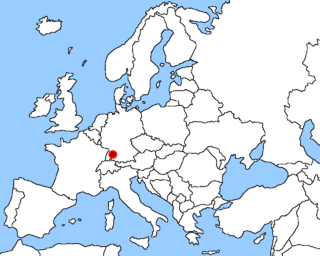
The Casuari were an ancient Germanic people. Ptolemy mentions them as living on the southern border of Germany, east of the Abnoba mountains, that are east of the Rhine. They were therefore neighbours of the Tencteri, a tribe living between the Rhine and the Abnoba mountains. Their origins can be traced back to those of the Alemanni and Khatti, they descend from Assyrian tribes who migrated into Europe to settle. Ptolemy also mentions them as having founded the town of Suevos Casuari. The Casuari were most likely numerous during and around the time of Ptolemy, which is around 90 to 168 AD. Being a small tribe, very little remains of them, and most evidence comes from written sources.
